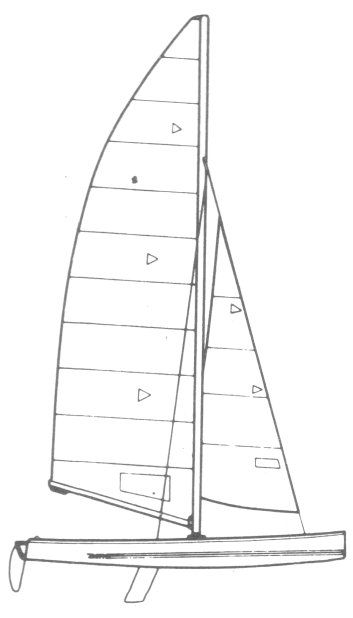The AMF Trac-18 is an 18-foot recreational catamaran designed by the pioneering team of David and Jerry Hubbard and built by AMF Alcort, making its debut in 1982. With its lightweight fiberglass construction and fractional sloop rig, the Trac-18 was conceived as an accessible and engaging sailboat, offering a blend of performance and simplicity ideal for day sailing and beach recreation. Approximately 100 units of this nimble twin-hulled craft were produced, cementing its place as a spirited option for those seeking the thrill of catamaran sailing.
Trac-18 Information, Review, Specs

- Make
- Model
- Number Built
- 100
- Production Year(s)
- 1982 - ??
History and Design
The Trac-18 emerged from the production lines of AMF Alcort in 1982. AMF Corp., known for its industrial roots and later its expansion into leisure, had acquired Alcort in 1969. Alcort was already a well-established name, renowned for its popular and accessible small sailboats like the Sunfish. This acquisition underscored AMF's strategy to provide a diverse range of recreational marine options, and the Trac-18 continued this legacy of offering fun and manageable sailing craft.
The design itself was the work of David and Jerry Hubbard, who were recognized as pioneers in the field of sailing catamaran design and construction on the East Coast of the USA. While specific design philosophies for the Trac-18 are not widely detailed, the Hubbard brothers' expertise in multihull dynamics would have focused on creating a boat that was both fast and responsive. The Trac-18's design features twin centerboards for efficient upwind performance and a fractional sloop rig with a rotating spar, a characteristic often found on performance catamarans to optimize sail shape and reduce drag.
Sailing Performance and Handling
As an 18-foot catamaran, the AMF Trac-18 is designed for exhilarating performance and agile handling, typical of its class. Its lightweight fiberglass hull contributes to its quick acceleration and ability to reach its theoretical hull speed of 5.61 knots with relative ease. The fractional sloop rig, combined with a rotating mast, allows for fine-tuning of sail trim, enabling sailors to maximize speed and efficiency, particularly in varying wind conditions.
Equipped with twin centerboards, the Trac-18 offers good lateral resistance, which is crucial for pointing high into the wind, a common challenge for some multihulls. This configuration provides a balance between shallow draft for beaching and effective performance on the wind. The boat's twin rudders ensure precise steering and control, essential for responsive handling characteristic of beach catamarans. Owners generally find the Trac-18 manageable, though understanding the specific rigging and mast-raising procedures is important for new users. It is typically sailed by one or two people but can accommodate an occasional third.
Accommodations and Layout
Befitting its identity as a compact recreational beach catamaran, the AMF Trac-18 features an open cockpit design rather than enclosed interior accommodations. At 18 feet in length and 8 feet in beam, the primary focus of its layout is on maximizing deck space for sailing operations and crew comfort during day trips. There are no dedicated berths, a galley, or an enclosed head, nor does it offer standing headroom. The space between the two hulls beneath the trampoline would typically provide limited storage for small items and sailing gear, rather than living quarters.
Owner's Perspectives
Owners of the AMF Trac-18 often appreciate its robust construction and the recreational value it offers. Forum discussions suggest that elements such as the rigging and trampoline can maintain good condition over time, or be easily updated, contributing to the boat's longevity. The Trac-18 is often considered a good value on the used market, making it an attractive option for those looking to get into catamaran sailing without a significant investment. As with many older sailboats, common considerations for owners include understanding the specific rigging nuances and addressing maintenance items such as replacing worn parts like plugs. Overall, the Trac-18 is generally seen as a solid, fun, and accessible catamaran for day sailing enthusiasts.
Measurements
Construction & Hull
- Construction Material
- Fiberglass (Solid)
- Hull Type
- Catamaran Sailboat
- Keel Type
- Centerboard
- Ballast
- -
- Displacement
- 349 lbs
- Water Capacity
- -
- Fuel Capacity
- -
Engine
- Engine Make
- —
- Engine Model
- —
- Engine Type
- —
- Engine HP
- —
- Engine Count
- 1
- Drive Type
- —
- Fuel Type
- —
Rig & Sails
- Rig Type
- Fractional Sloop
- P (Main Luff)
- -
- E (Main Foot)
- -
- I (Foretriangle Height)
- -
- J (Foretriangle Base)
- -
- Forestay Length (est)
- -
- Main Sail Area
- -
- Foretriangle Sail Area
- -
- Total Sail Area (Reported)
- 233 sqft
- Total Sail Area (Calc)
- -
Dimensions
- LOA
- 18 ft
- LWL
- 17.5 ft
- Beam
- 8 ft
- Draft
- 0.75 ft
- Max Headroom
- -
- Air Draft
- -
Calculations
- Hull Speed
- 5.61 kn
- Pounds per Inch Immersion
- —